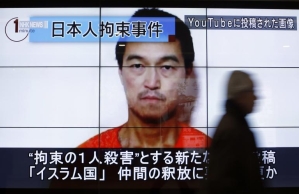
The Islamic State, widely known as ISIS, released an audio message Wednesday night reportedly featuring the voice of Japanese hostage Kenji Goto that extended the deadline for an unprecedented prisoner swap.
According to Karin Laub and Mohammed Daraghmeh of the Associated Press, the English-language audio recording said that the country of Jordan must present Sajida al-Rishawi at the Turkish border by sunset Thursday, or else ISIS will kill Jordanian pilot Mu'as al-Kasaseabeh.
"Please save the life of Kenji," Kenji's mother, Junko Ishido, said in a message aimed at Japanese Prime Minister Shinzo Abe. "I call on you to work with all your strength in negotiations with the Jordanian government, until the very end."
Abe reinforced his stance Thursday in condemning the Islamic terror group, although the Associated Press noted that he did not refer directly to the video.
"The heinous terrorist act is totally unforgivable," the prime minister said in Parliament in response to a ruling party lawmaker's question.
According to the Associated Press, a few dozen people gathered outside Abe's official residence, holding banners with messages of hope for Goto's release. One of those people included 46-year-old Seigo Maeda, a friend of Goto.
"I have been trying to keep my hopes up and believe that Mr. Goto will return," Maeda said. "I have this faith within me."
The Associated Press reported that Goto, a Christian freelance journalist, was captured in October after he tried to rescue 42-year-old Haruna Yukawa. ISIS militants have reportedly killed Yukawa, stunning the nation of Japan.
Jethro Mullen, Mariano Castillo and Catherine E. Shoichet of CNN reported that Jordan has expressed interest in swapping prisoners. However, it remains unclear whether or not ISIS would exchange both Goto and al-Kasaseabeh as part of the deal in swapping al-Rishawi.
"I firmly ask whomever has sent Moaz to fight outside the borders of Jordan, on a mission unrelated to us, to make strong efforts to bring back Moaz," Safi al-Kassasbeh, the pilot's father, said Tuesday.
Both the Associated Press and CNN could not verify the authenticity of the recording. However, Jordan's King Abdullah II faced pressure from his own people to bring the pilot home.
"Any exchange would set a precedent for negotiating with the Islamic State militants, who in the past have not publicly demanded prisoner releases," Laub and Daraghmeh wrote. "Jordan's main ally, the United States, opposes negotiations with extremists."
According to the Associated Press, releasing al-Rishawi, an al-Qaida-linked Iraqi woman convicted for her involvement in the deadly 2005 Amman hotel bombings, would be a propaganda victory for ISIS if the prisoner swap takes place. In addition, ultra-conservative Islamic groups in Jordan have expressed their displeasure at the king for participating in the U.S.-led alliance targeting ISIS in Iraq and Syria.
"Public opinion in Jordan is putting huge pressure on the government to negotiate with the Islamic State group," Marwan Shehadeh, a scholar with ties to ultra-conservative Islamic groups in Jordan, said. "If the government doesn't make a serious effort to release him, the morale of the entire military will deteriorate and the public will lose trust in the political regime."
Even the pilot's family has expressed displeasure at the Jordanian government's response, accusing them of being "not serious in the negotiations." The Associated Press reported that the king granted access to al-Kassasbeh and his wife to talk about the situation.
"The king told me that Muath is like my son and God willing everything will be fine," al-Kasaesbeh said afterward.
However, the pilot's father told CNN that the cases of Goto and his son should not be mixed up.
"To link Moaz's situation with the Japanese journalist, this has nothing to do with us," al-Kasaesbeh said. "The Japanese journalist has his country to defend him."






